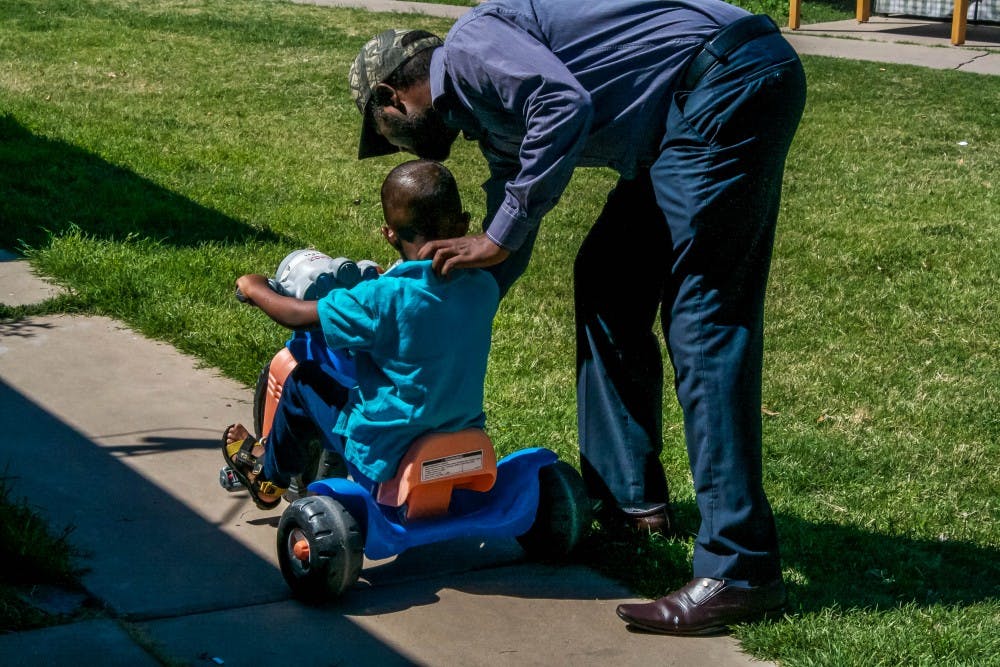Bare walls are covered with paintings. An unfurnished room is filled with furniture. Empty cabinets are filled with kitchenware. The once sparse apartment turns into a decorated home. One local organization is behind this transformation: The Welcome to America Project.
The non-profit organization assists refugees who resettle in Maricopa County. Along with making basic-needs deliveries, the organization provides clothing through the Clothes Closet program and launched a cooking class where refugees teach members of the community how to make dishes from their culture.
The project will be hosting its first Hike to Help and Welcome Walk on May 9 from 7:30 a.m. to 1 p.m. at Desert Mountain High School in Scottsdale.
Collin Cunningham, executive director of the Welcome to America Project, says the "hike-a-thon" is important to the organization.
“We really want to honor the refugee journey and raise awareness about refugee issues as well as garnering some support,” Cunningham says.
She says the organization has stayed true to its heart by fulfilling needs not being met by other organizations.
“We’re a part of a broader resettlement picture and we really want to make sure that we’re filling a gap and complementing what the organizations and agents are doing," Cunningham says. "So we’re not duplicating efforts but we’re working together."
Gilbert resident Chris Lay has been involved with the Welcome to America Project since September 2014. He says the project is about welcoming the refugees to the community.
“Welcome to America (Project) is really meeting that need both by giving them some simple items that make their basic apartment feel like home," Lay says. "But even more importantly [it's about] welcoming them to the states and giving them some encouragement and letting them know that they’re not alone."
Tempe resident and ASU alumna Carly Fleege, who volunteers with the project and is on the organization’s communications committee, says the Welcome to America Project couldn’t be compared to other refugee organizations because it has a narrow niche.
“It’s very unlike other non-profits that help serve refugees and part of that is because organizations like the resettlement agencies they’re able to do certain things, but we kind of fill that gap that they can’t service,” Fleege says.
Fleege says the communications committee supports the organization’s mission through different mechanisms such as social media and email. She says they let the community know about different events and volunteer opportunities.
She says of the committee: “We maintain the website and do some video work and things like that—all of the little things that tell Welcome to America Project’s story.”
Fleege says there are various ways for community members to volunteer including going on home deliveries and donating needed items.
Lay has donated funds, clothing and toys as well as his time to the organization.
“We see how the resources are being used,” Lay says. “We see the donation immediately going to meeting the needs of the refugee community here locally.”
Lay says he also volunteers with the home deliveries over a dozen times and sees firsthand what the organization is all about.
“It’s just breathtaking to see how you can go into what feels like a completely empty home and when you leave they’ve got furniture,” Lay says. “They’ve got a television. They’ve got smiles on their faces sometimes tears in their eyes from just feeling this kind of a warm welcome from people, more than the items, just that feeling of being welcome.”
Another way the organization is meeting the needs of the refugee community is through the Clothes Closet Program. The program is available to all refugees. Volunteers take them through the clothing area to pick out clothes for them and their families.
“Refugees come with basically nothing—maybe one suitcase of clothing,” Cunningham says. “They get jobs and their kids grow and those needs evolve. They have an ongoing need for clothing.”
Additionally, the organization piloted a cooking class program in February. Cunningham says her group would like to do more to launch the program since everyone loved it.
“We have also launched a cooking class program to try and build bridges of understanding, provide opportunities for local community members and refugee community members to interact and learn from each other,” Cunningham says. “We have cooking classes where refugees are teaching the local community how to some select dishes from your culture.”
In addition to these programs, she said the community could hold donation drives and talk about their experiences with the organization, in addition to discussing refugee issues.
Cunningham says the Welcome to America Project has assisted over 2,000 refugee families and sees about a third of the refugees who resettle in Maricopa County. However, they would like to see more.
“Eventually we’d love to go to Tucson and provide the same sort of support that (refugees) get out here in Maricopa County," she says.
Fleege says her passion for the refugees’ issues keeps her going.
“I think for me the passion drives the human element of how would I want to be treated in a similar situation if I were forced to leave my home country,” Fleege says. “I’d want somebody to welcome me and to help me put that first step forward."
Cunningham says she would like the community to know they can get involved locally.
“I hope that people will look at what’s going on around the world and know that they can have a local impact on those world issues by supporting refugee resettlement, hopefully here in our community,” she says.
At the end of the day, Lay says he’s happy the refugees have come to America.
“This struggle that they’ve had wherever they’ve come from—we’re glad that they’re here and glad that they’re safe and excited that they have a chance to live the American dream that we take for granted,” he says.




